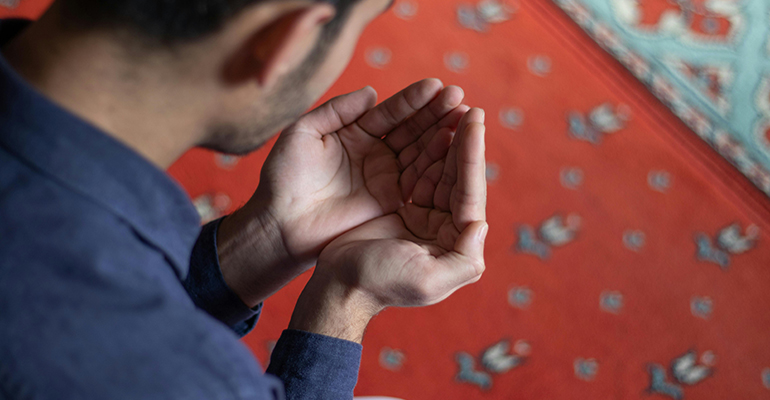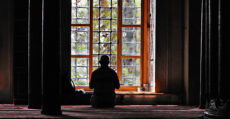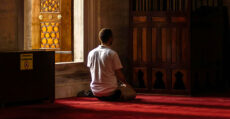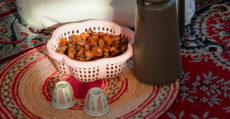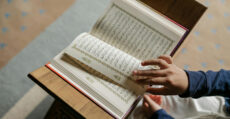Visit our YouTube channel for more
Shaykh Ibraaheem al-Farraaj advised:
May Allaah grant you goodness.
It has been narrated that al-Ashtar once entered upon ‘Alee ibn Abee Taalib رضي الله عنه – after part of the night had passed – while he was standing in prayer.
So he said to him:
‘O Leader of the Believers, fasting during the day, staying awake at night, and toiling in between.’So when he finished his prayer, he replied:
‘The journey of the Hereafter is long, and requires being travelled by night – that is, by worship during the night.’There was a woman – the wife of Habeeb ibn Muhammad al-Faarisee, who used to wake him at night and say:
‘Rise, O beloved, for the road is long, and our provisions are little, and the caravans of the righteous have already departed, while we have been left behind.’All of this, the author brings forth to highlight the issue of الإدلاج – meaning travelling during the last part of the night, and engaging in worship during the last part of the night.
Those people – devout worshippers, scholars, and righteous ones – used to do this because they were self-critical and lacked confidence in their own deeds.
For this reason, they kept performing deed after deed, hoping that Allaah ﷻ might accept [something] from them.
For this reason, Ibn ‘Umar used to say:
‘I wish that Allaah ﷻ would accept from me even the weight of a single atom.’Ibn ‘Umar was known for his complete and total adherence to the Prophet’s ﷺ teachings. He was among the scholars of the Companions.
‘Umar رضي الله عنه trusted him, saying:
‘No one has any say in the matter of the khilaafah except Ibn ‘Umar; [so] just consult him.’– because he trusted his piety and his judgement رضي الله عنهما.
[Yet despite that, he would still say:]
‘I wish that Allaah ﷻ would accept from me even the weight of a single atom.’[Meanwhile] many people amuse themselves and idle about as if Allaah ﷻ has already accepted all their deeds, without a doubt whatsoever.
And what we are speaking of now is that a person may enjoy himself and relax a little, but with moderation.
Just as worship should be done in moderation, so too should permissible things be done with moderation.
Because indulging excessively in permissible things is one of the major obstacles that prevent one from connecting with Allaah ﷻ and from the rectification of the heart.
In fact, Ibn al-Qayyim رحمه الله said that
‘sitting with the scholars’– [note he said]
‘the scholars’– he didn’t say ordinary people, but
‘the scholars’‘if it does not lead to an increase in knowledge or a strengthening of eemaan, [then] too much of it is harmful.’[He said]
‘the scholars’– he’s not talking about anyone else.
[So] if you sit with them and it is not to learn, or to strengthen your eemaan, or to benefit from their guidance and so on, then know that such a gathering may actually harm you, rather than benefit you.
Why?
Because it is an excess; an addition of no value. It harms you, [and] does not benefit you.
So what are we doing sitting, and [preoccupied] with our mobile phones?
Leave aside the one who looks at forbidden things – whether lusts or doubts – and even enjoys them.
Leave aside the person who looks at forbidden things, whether they are lusts or doubts, and seeks them out and finds pleasure in them.
[Rather], I am [specifically] talking about a person who looks only at permissible things, and his mobile phone is in his hand.
When he finishes with one app, he moves to the second, then the third, then the fourth, then the sixth! He spends his whole day looking at his phone. How can such a person’s heart be sound?
This is an indulgence in trivial matters that has blinded his heart.
And [know that] Allaah is Generous; if you return to Him, He will rectify your heart.
But, beware of indulging too much in permissible things.
[Even] food and drink – if you overindulge, it will harm you, won’t it?
Well, [likewise] the heart has its own ‘food’. If you nourish it with what benefits [it], it will be sound, active, happy, and successful.
But if you nourish it with what is of no benefit – even if it is permissible – it will prevent you from [engaging in] obligatory deeds.
[It is reported that] Imaam Ahmad was once with al-Marwoodhee, and they passed by a picture [of] some form drawn on a wall.
Imaam Ahmad said to al-Marwoodhee:
‘Do not look at it.’‘Why?’‘Because even one glance at such an image would affect your heart.’A single glance!
So what about the person who spends 24 hours-a-day looking at permissible things on his phone! I’m not talking about what is forbidden.
How will this affect him?!
It will have a great effect on you, and you won’t even feel this effect unless Allaah ﷻ grants you the guidance [to realise it].
So letting the soul run free even with permissible desires affects your worship, and affects your devotion to Allaah ﷻ.
And if one falls into the forbidden, then of course the matter is even more severe.
As for the one who falls into what is forbidden, then their situation is even more severe.
Yet our Lord is Merciful – rather, He is the Most Merciful of the merciful.
He is the Compassionate, the All-Merciful, the Gentle, the Kind, the Loving.
And He is the All-Encompassing, in all of these attributes.
[So] if you turn to Him, [know that] He will turn to you.
And if you ask Him sincerely to keep you away from these things, He will keep you away.
Take from it [and the world in general] only what you need, and leave the excess.
You will then rectify yourself, and your heart will be enlightened [to all that is good], and you will live a good life [in shaa.-Allaah].
Why?
Because the path to a good and happy life is the path that Allaah ﷻ has told us about, from eemaan, righteous deeds, and turning to Allaah ﷻ.
[Know that] if you were to take another path, it will only lead you to the opposite of what you seek.
The person who spends 24 hours-a-day looking at his mobile phone – what is he looking for? He is looking for happiness, isn’t he?
[But] what he has made a means to happiness will turn against him and become a cause of misery [for him].
At the very least, a person will feel a heaviness and tightness in his chest, and this is very common.
Why?
Because you have turned away from Allaah ﷻ.
[So] turn [back] to Allaah ﷻ with a sincere heart, and your heart will be enlightened, and you will live a good life [in shaa.-Allaah],
No matter what ailments you may have in your body, for example, but if your heart is enlightened, you will be at ease.
[On the other hand] many people have all the wealth in the world, yet their hearts are constricted.
They don’t find happiness in anything in this world – [neither] wealth, children, status, leadership, pride, etc. They have everything, but it means nothing.
[If it was possible] they [would] say,
‘Give me an hour of happiness, and you can have whatever you want.’
Genuine happiness is in turning [wholeheartedly] to Allaah ﷻ.
That is why Shaykh al-Islaam رحمه الله said that the heart’s need for Allaah, for knowing Him, for knowing His Names and His Attributes, and having unconditional trust in Him, and for the inner acts of worship in general is greater than the body’s need for food and drink.
The body lives on food and drink, and the heart lives on the remembrance of Allaah ﷻ.
And when the heart is ‘alive’, a person’s life becomes easy and their heart is enlightened.
The opposite of this, is the opposite of that.
Read [1].
[1] Instruction to student
Translation originally published on 7 September, 2025

